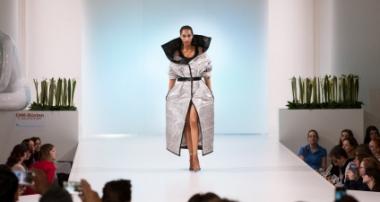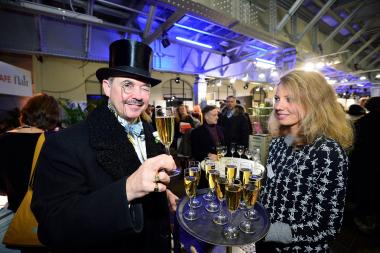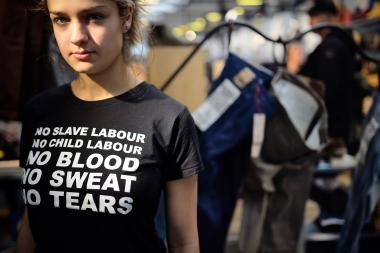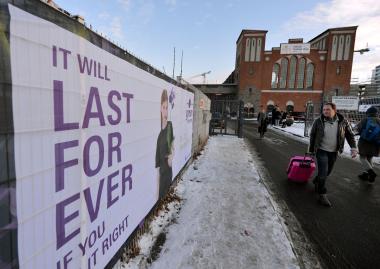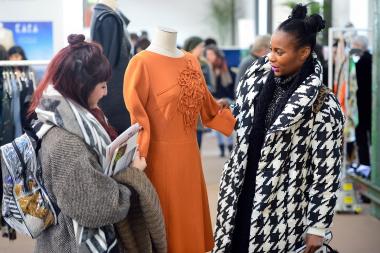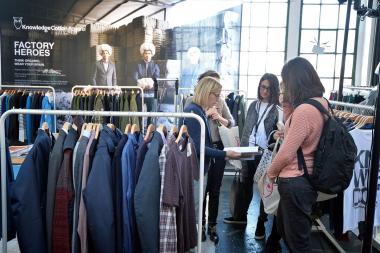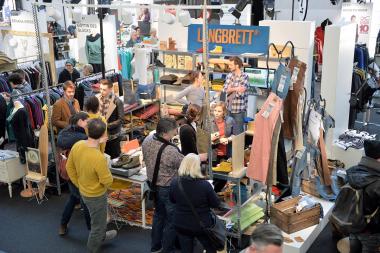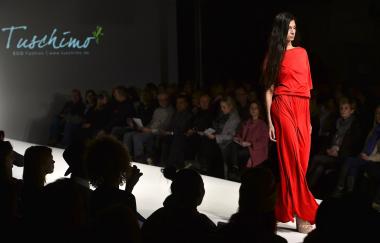TECHTEXTIL ON A GROWTH CURVE
Living in Space: Techtextil presents technical textiles in the aerospace industry in cooperation with ESA and DLR
More exhibitors and a journey to Mars: visitors and exhibitors can look forward to an even bigger event and a completely new trade-fair experience at the coming Techtextil from 9 to 12 May 2017. With around four months still to go before the leading international trade fair for technical textiles and nonwovens opens its doors, the booked space already exceeds the total area of the last edition in 2015. Moreover, the extensive complementary programme of events is set to be distinguished by a variety of innovations in 2017. The highlight of this year’s Techtextil will be the special ‘Living in Space’ event in cooperation with the European Space Agency (ESA) and the German Aerospace Centre (Deutsches Zentrum für Luft- und Raumfahrt – DLR).
“We are branching out in completely new directions with this year’s Techtextil and are, therefore, all the more delighted about the outstanding resonance of our exhibitors”, says Olaf Schmidt, Vice President Textiles & Textile Technologies, Messe Frankfurt. “Furthermore, the fact that we have gained strong new partners, ESA and DLR, from one of the main areas of application for technical textiles represents solid evidence of the application relevance of the products and technologies shown at Techtextil.”
Exhibitors include not only international market leaders but also numerous newcomers and returnees. Significant exhibitor growth comes from European countries, particularly from Ger-
many, Italy, the Netherlands, Poland, Switzerland and Spain. However, additional growth is also expected to come from Asia.
Special ‘Living in Space’ exhibition and special area in Hall 6.1
In cooperation with the European Space Agency (ESA) and the German Aerospace Centre (DLR), Techtextil will illustrate the wide range of applications for technical textiles with reference to the aerospace industry under the title ‘Living in Space’. To this end, the concurrent Texprocess trade fair will also be integrated into the exhibition.
“The technical-textile sector offers the textile solutions needed to move around and survive in space. This is what we will show in a professional and at the same time entertaining way on a dedicated area at the trade fair. For visitors, the area will offer inspiration and orientation”, says Michael Jänecke, Director Brand Management Technical Textiles & Textile Processing, Messe Frankfurt.
A special area in the vicinity of exhibitors of functional apparel and technical textiles is being created in hall 6.1 and, based on the areas of application for technical textiles, will show high-tech textiles and textile-processing technology from and for the aerospace sector. The highlight of the interactive area is a virtual-reality experience. On a special area, Techtextil and Texprocess visitors can undertake a virtual journey through space to Mars and discover how technical textiles and their processing technology can make it possible to set up communities in space. Additionally, the ‘Material Gallery’ will show textile products and processing technologies from Techtextil exhibitors with links to space travel. There will also be presentations by start-ups that work at the interface of technical textiles and space travel.
In hall 6.1, exhibitors and visitors will also find the ‘Innovation made in Germany’ area of the Federal Ministry of Economics and Energy (Bundesministerium für Wirtschaft und Energie – BMWi), which is aimed at young, innovative companies based in Germany. Applications for a place in the BMWi area can still be made on the Techtextil website.
Change in placement for CAD/CAM and Cutting, Making, Trimming
To make the profiles of Techtextil and Texprocess even sharper, the bonding and separating technology, CMT (Cutting, Making, Trimming), CAD/CAM and printing product segments will be concentrated together at Texprocess in hall 4.0. Thus, visitors will find Techtextil exhibitors from these segments at Texprocess. These product groups will be deleted from the Techtextil nomenclature.
Complementary programme with changes to the Innovative Apparel Show
Successfully started at Techtextil and Texprocess in 2015, the Innovative Apparel Show will get in 2017 even more international with universities for fashion and design from four European countries. These universities will present their visionary product ideas using technical textiles and modern processing technologies on all four days. They are: Accademia Italiana, Florence / Italy; ESAD College of Art and Design, Matosinhos / Portugal; Esmod Paris/France, and the University of Trier / Germany. The young designers will show designs revolving around the themes of textile effects, creative engineering and smart fashion while a fashion show in the foyer of Halls 5.1 and 6.1 presents their ideas in a professional way.
Techtextil Symposium in cooperation with Dornbirn MFC
The concept of Techtextil Symposium, one of the world’s leading events for textile research, is being expanded with the coming edition to be held in seven consecutive blocks, each of seven lectures. Thus, all lecture blocks will be expanded by one lecture. Additionally, Techtextil is working together with the Dornbirn MFC Man-made Fibres Congress for the first time. Thus, Dornbirn-MFC will organise one of the seven lecture blocks within the framework of the symposium (to be held in ‘Saal Europa’ of Hall 4.0).
Moreover, outstanding new developments and advances in the fields of technical textiles, nonwovens and functional apparel textiles will be honoured for the 14th time with the Techtextil Innovation Award, the competition for which is also open to non-exhibitors. Entries are now invited. The deadline for receipt is 20 February.
Together with the international Tensinet network, Techtextil is holding the 14th ‘Textile Structures for New Building’ competition for students and young professionals, which honours innovative and practical concepts for building with textiles or textile-reinforced materials. The closing date for receipt of entries to the competition, which is worth a total of € 8,000, is 26 February 2017. In addition to the awards ceremony, all award-winning works from the student competition and the Innovation Award will be on show in special exhibitions in hall 4.1 and hall 6.1.
Technical Textiles market continues growth
According to the Confederation of the German Textile and Fashion Industry (textile+mode) the textile and apparel industry with more than 130,000 employees, 1,400 companies and an annual turnover of around 32 billion euros is the second largest consumer goods industry in Germany. The growth is primarily driven by technical textiles. “German companies are the global market leaders in terms of technical textiles. For years, the turnover has been growing steadily – a proof for the innovativeness of the industry and excellent products. The digitalization of textile products and processes will furthermore trigger an innovation boost in other industries”, says Manfred Junkert, Deputy General Manager of textile+mode.
Held concurrently with Techtextil, Texprocess, Leading International Trade Fair for Processing Textile and Flexible Materials (9 to 12 May 2017), offers insights into all stages of textile processing, including finishing and digital printing. Texprocess is also characterised by an outstanding number of exhibitor registrations exceeding the results of the previous edition, too. Techtextil 2015 was attended by 28,500 trade visitors from 102 nations, as well as over 5,500 trade visitors from the parallel Texprocess.
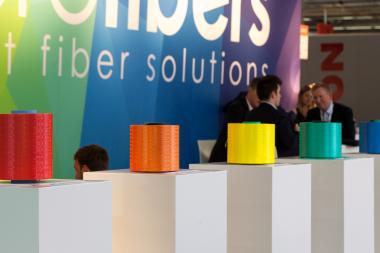 @ Messe Frankfurt Exhibition GmbH
@ Messe Frankfurt Exhibition GmbH
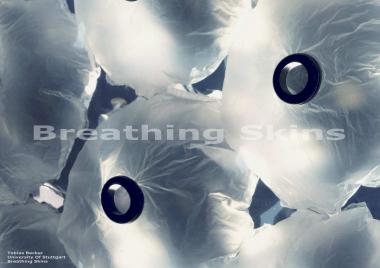 @ Messe Frankfurt Exhibition GmbH
@ Messe Frankfurt Exhibition GmbH
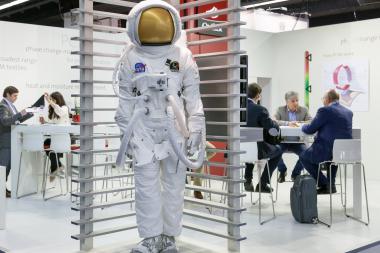 @ Messe Frankfurt Exhibition GmbH
@ Messe Frankfurt Exhibition GmbH
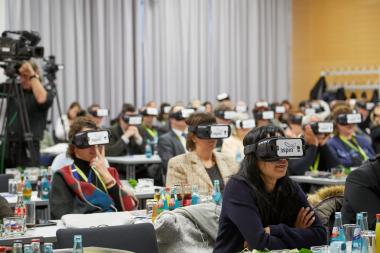 @ Messe Frankfurt Exhibition GmbH
@ Messe Frankfurt Exhibition GmbH
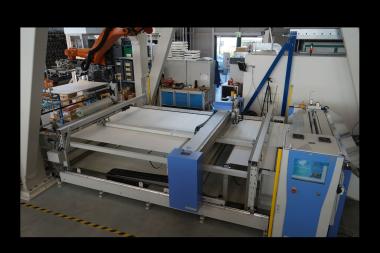 @ Messe Frankfurt Exhibition GmbH
@ Messe Frankfurt Exhibition GmbH
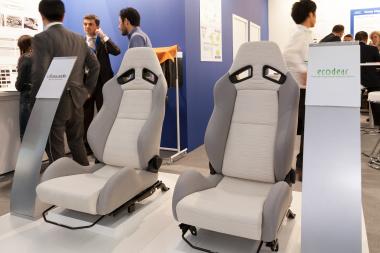 @ Messe Frankfurt Exhibition GmbH
@ Messe Frankfurt Exhibition GmbH
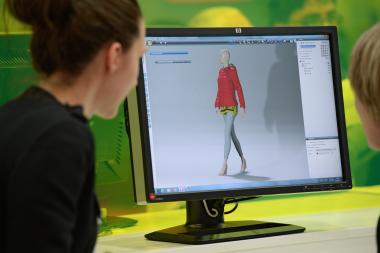 @ Messe Frankfurt Exhibition GmbH
@ Messe Frankfurt Exhibition GmbH
Messe Frankfurt Exhibition GmbH Techtextil, visitor record, Texprocess Hightech Technical Textiles space travel
Textination GmbH


